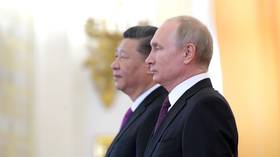How a plane crash has exposed the West’s racism towards China

Several days ago, a US F-35 fighter jet fell into the South China Sea during a military exercise. Despite the current geopolitical tensions, you would imagine this would be considered relatively insignificant as fighter jet accidents are not uncommon.
However, because the incident occurred in territory effectively claimed by Beijing, the media reaction has been predictably hysterical, with a narrative framing the aftermath of the crash as a race to who can retrieve the plane first.
The implication is clear: China wants to ‘steal’ the aircraft and harness its technology before the US can salvage it itself. It’s important to point out that at this stage, there is no evidence of China seeking to do so, and any media claims of this nature are based solely on insinuation and speculation.
Yet, immersed in this hyperbolic coverage is a deeper, darker narrative. It embodies a set of assumptions and prejudices about how China is likely to behave, and in turn feeds into legitimation of hostile policies against the country through the promulgation of rampant paranoia and irrational fear.
China’s portrayal as an inherently ravenous, dishonest technology thief encompasses age-old racism. But now it’s wrapped up in a fresh coating of anti-communism, as the theory is put forward that Beijing is determined at all costs to get its hands on American technology.
In recent years, the suggestion that China ‘steals intellectual property’ has been pushed into the mainstream by right-wing American politicians, despite being based on scant evidence. The fact China still lags behind the US in the production of semiconductors – and relies so deeply on its licensed patents – is just one logical counter to this dishonest argument. However, its origin is much older, as associating China with theft is a discourse that evolved from explicit 19th century racism.
In 1886, during the era of the ‘Yellow Peril’ in Australia, the Sydney-based Bulletin magazine published a horrific racist cartoon entitled the ‘Mongolian Octopus’, which depicted a caricature of a Chinese man with many tentacles wrapping itself around people. Each tentacle carried negative wording about China, including ‘opium’, ‘robbery’, ‘cheap labour’, ‘immorality’, ‘small pox’, and ‘bribery’.
This racist cartoon is unacceptable in the 21st century, yet it is evident that the themes it promotes, which frame Chinese culture as deceitful, dishonest, and immoral, continue in more subtle forms today. That’s why we see the scapegoating of China for Covid-19, for example, and why it’s implied that the Communist Party steals.
In painting China as a technology thief, it is widely assumed that it cannot innovate itself and its economic development has come off the back of stealing US intellectual property, a false claim popularised by Donald Trump as a way of blaming Beijing for America’s woes. These assumptions carry undue weight in Washington, which explains the obsession with adding Chinese companies to the commerce department’s trade-restricting entity list in the belief that China’s technological development can be stopped or curtailed through blacklisting American components.
But the reality could not be more different. In practice, China has filed the largest number of registered new patents worldwide for several years now. In addition, it also publishes more scientific papers than any other country. Many of China’s technologies, including nuclear energy, hypersonic missiles, high-speed rail, 5G, renewables, quantum computing, and artificial intelligence, equal or even surpass US capabilities. The claim that China – with such an increasingly educated and large population – cannot innovate is clearly a falsehood, and one packaged for political purposes.
When it comes to fighter aircraft in particular, there is a consensus that the F-35 is slightly ahead of China’s own Chengdu J-20, but that the latter is catching up fast. So on that note, do you think it is really necessary for Beijing to steal an F-35 from the ocean in plain sight? This would only consolidate this hostile narrative, but the reporting of the crash story would have you believe so.
Media claims of a scramble for the jet represent the latest example of longstanding prejudices that have dominated Western discourse on China. The country and its population are painted as spies and thieves who will do absolutely anything to claim someone else’s technology, an argument that has had hugely negative ramifications for legitimate Chinese scholars, researchers, students, and companies alike.
In a nutshell, a form of racism has effectively secured mainstream legitimacy through America’s paranoia-fuelled crusade against China and is willingly being repackaged by Western journalists. And the F-35 story is a reminder that sometimes these claims are peddled without us even realizing it. An article is not just about what it tells us – but also the ideas and arguments which it assumes in framing the topic.
The statements, views and opinions expressed in this column are solely those of the author and do not necessarily represent those of RT.














